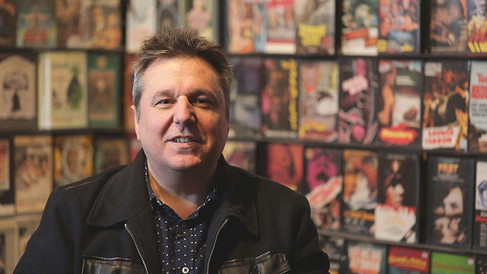FrightFest Interview: Ry Levey for BOUTIQUE: TO PRESERVE AND COLLECT
- Rich

- Aug 14, 2024
- 5 min read
Keepin’ it alive
There is no better time to celebrate physical media and Ry Levey’s latest documentary shines a bright light on a scene so many of us hold dear. Whether you are a seasoned cinephile or having just waded through the swamp of streaming (and finally seen the light of day), Boutique: To Preserve and Collect is a insightful trip packed with familiar faces and voices who continue to educate us all on the importance of cinema and its preservation.
Before his FrightFest premiere in London, Ry took some time out to not only discuss physical media but also share the approach to filming his documentary along with the importance of how the boutique labels have helped keep cinema alive and lend an important voice to those less represented on film.
As with all involved in this scene, you really are doing the Lord’s work here. How did you start to approach this subject and retain so much focus on such a broad area of expertise?
Physical media has been in my life for as long as I can remember. My mother was a video sales rep in the ’80s and ’90s, and my stepfather worked in and around adult films. Obsessed with Fangoria and Gorezone, I eventually became a tape trader working in both commercial and adult video stores. So, my knowledge comes from a lifetime of cinema exposure of all kinds of filmmaking and levels of the industry. My collecting drove me to delve further into these labels and explore how their work has been part of a larger conversation involving film preservation, restoration, and the elevation of forgotten or underrepresented cinema.
The pacing of this documentary is spot on and the voices of our tribe inspired; all of which help deliver a concise ‘story of film’. Was this the idea from the offset, or was there a temptation for voiceover/narration?

I have a personal aversion to voice-of-God-style narration. I like to allow my subjects to move the narrative forward. I’m also aware of timing and making sure that an audience gets fascinating insights and information while never being boring. Good pacing is the key to never losing a viewer. I’m pleased when anyone appreciates that element, as a great deal of time from the director and editor goes into that process.
Do you feel we are past the turning point of physical media beginning to make a comeback — that we are “out the other side” — or do you think the more niche circles have always been here to stay?
I feel that film fans are starting to see that streaming sites are not the complete answer to finding films because we see many movies and series disappear after their window is up. A recent example is Mike Flanagan announcing that a physical media release is upcoming for his film Hush. After its license was over with Netflix the film could have risked being lost to time, much like the silent films and the golden age of cinema were. These labels are showing the importance of physical media. Hopefully, we will see a continuing trend of more people purchasing copies of films. Collectors are their own form of cinema archivists.
What are your influences as a filmmaker, specifically in documentary filmmaking?
Wow! It’s interesting because the type of documentary I love differs from what I make. I’m drawn to and inspired by filmmakers like my friends (and mentors) such as Frederick Wiseman, Albert Maysles, Barbara Hammer, Peter Wintonick, and the late Julia Reichert. My years in film distribution, programming, and publicity afforded me so much privilege and access to my heroes. I absorbed their films and any knowledge they gifted me. My all-time favourite film is Jennie Livingston's Paris is Burning from 1990, which is still as exciting to me nearly 35 years after its release and a landmark in documentary and LGBTQIA+ cinema.
“I think the labels are able
to build a relationship of trust
with cinephiles.”
— Ry Levey
This is a very optimistic film. Was there a conscious decision to avoid too much focus on the impact of streaming on physical media and that distinct shift we have felt, or was it simply a case of focusing on the celebration of the scene?
We certainly touch briefly on how streaming has been good and bad, but I wanted to remind audiences why physical media is integral to the preservation of cinema, more than anything. This meant showing others who are not in the know about this exciting renaissance and the incredible work these labels do to make sure classic, cult and unrepresented cinema isn’t lost to time. Cinema is integral to history.
Preservation society. (Top left to bottom right) Severin Films' David Gregory, Vinegar Syndrome's Joe Rubin, writer Sam Deighan, and filmmaker Lizzie Borden
It’s beautiful to see how much you celebrate the important work surrounding diversity and marginalized voices. The boutique scene is fundamental in bringing specific films back to the surface — a documentary filmmaker would have to be tone deaf to not highlight this. My question is: Aside from the restoration, do you feel this is where the true revolution is at with the boutique labels?
I think the labels are able to build a relationship of trust with cinephiles. Once they have built that trust, they can expand their focus and bring eyes to films they might not otherwise consider. I think releases like Vinegar Syndrome’s Wakefield Poole films — Bijou and Boys in the Sand — are gorgeous and essential works, even though they are considered hardcore cinema. It’s visually stunning work, and people who wouldn’t usually watch such explicit content are seeing the value in these films. "Great cinema", regardless of the genre, is still great cinema. The work of labels like Severin, Criterion, Vinegar Syndrome, Arrow, Second Sight (and others) have inspired labels like Kani, the latter of which releases amazing underseen Asian cinema. Then there are the likes of Canadian International Pictures highlighting Canadian cinema, Saturn’s Core shining a light on the ’90s SOV films (Shot on Video), Altered Innocence focusing on queer and coming-of-age flicks… and so many others. The work of the veteran boutique labels has shown these other distributors that there is still a market for Blu-ray.
What is the one thing you have to say to those younger audiences about not just consuming ‘content’ but where to start with physical media?
I would say research boutique labels, read books on cinema that interest them, look to see if the films that catch their eye are available, and, if they are, seek them out! Each of these labels is creating mini film schools on these special editions, loaded with extras, commentaries, and more. That’s always a great place to start.
BOUTIQUE: TO PRESERVE AND COLLECT premieres at FrightFest London on Saturday 24th, 6pm. Buy your tickets here. Follow Ry on Instagram and keep up to date on his various projects via rylevey.com.












Comments